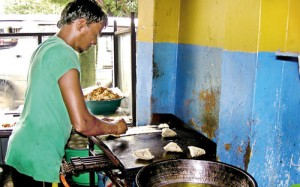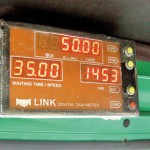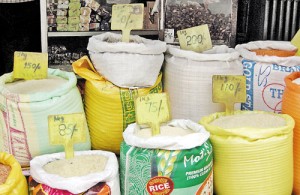News
Govt should enforce price drops, says Marzook
Consumer Affairs Authority (CAA) chief Rumy Marzook says a gazetted maximum retail price for goods would force traders to lower prices in line with price cuts announced in the budget, saying the CAA was powerless to prevent errant traders refusing to pass on the government price cuts.
“We don’t have legal provisions to force traders to bring down prices,” said Mr. Marzook, saying the CAA could only use persuasion in these

The price of flour-based short eats should come down says Mr. Marzook
situations.
“We have received complaints that some shops have not reduced the price of gas cylinders. In some places, despite the reduction in flour prices, they have not reduced bread or other bakery products. With gas prices reduced, some shops have not reduced the prices of prepared food,” the CAA Chairman said.
He said a gazette listing the maximum retail price would force traders to follow price reductions.
“We cannot force a tea shop to reduce prices. The shops should know they have to reduce prices with the prices of milk powder and sugar brought down. People should see that they are not exploited by errant traders and shops,” he said.
The prices of essential commodities came down with immediate effect from January 29 as a result of he much-awaited interim budget for 2015.
The price of a 12.5kg gas cylinder was reduced by Rs. 3,000 and now may be sold at Rs. 1,596; a 400g packet of milk powder was reduced by Rs. 61 and can be sold at Rs. 325.

Consumer Minoli Perera
Sugar had a Rs. 10 price reduction, Sustagen milk powder by Rs. 100, wheat flour by Rs. 12.50 per kilo, bread by Rs. 6, canned fish by Rs. 60, sprats by Rs. 15, green gram by Rs.40 per kilo, Maldive fish by Rs. 200, turmeric by Rs. 100 per kilo, coriander by Rs. 60 per kilo and chilli powder by Rs. 25 per kilo.
The wheat flour price reduction led to the Bakery Owners’ Association deciding to bring down the price of a 450gram loaf of bread by Rs. 6 and other bakery products to be reduced from Rs. 1 to Rs. 5. It is a vast industry: the association says there are 6,000 bakeries in the country, and 2 million loaves (907,185kg) of bread consumed daily.
Bakery Owners’ Association spokesman N.K. Jayawardena said the association had advised members to lower prices but could not enforce this. He added that members would cite other factors such as high taxes on other ingredients as a reason for maintaining higher prices.

A.G. Stephens, a pensioner
“The import taxes are high for margarine and palm oil. For margarine the tax itself is Rs.175 per kilo and for palm oil it is Rs. 110 per litre,” he said.
Sales were now picking up for items such as Maldive fish and other spices, green gram and other pulses that had remained on shelves due to their previous high prices, Old Moor Street Traders’ Association President P. Sundaram said.

Three-wheeler driver G. Kumara
It had been years since traders had seen reductions in the prices of dry rations, he added.
Consumer Minoli Perera from Homagama said that although some bakeries had not cut prices the lower prices brought in for gas, milk powder, sugar, bread, canned fish and bus fares were a relief to housewives with young children.
A.G. Stephens, a pensioner from Wellawatte said the reduction of bus fares was a good move and that pensioners were happy about the increase in pensions.
“It is the prices of vegetables that concerns us,” he said.
The owner of a small food outlet in Colombo 2, M. Gunatilleke has taken Rs. 5 off the price of a cup of tea in his shop, with milk tea now Rs. 25 and plain tea Rs. 10, but had not reduced food prices yet.

R. Shankar, owner of a vehicle spare parts shop
“We will decide this week,” he said, acknowledging that some shops had lowered charges, for example with hopper prices dropping from Rs.15-12 or from Rs. 12-10.
“If the price of rice and dhal was reduced, we could have reduced the price of lunch packets,” he said.
There have been Rs. 10 drops in the price of a lunch packet and other prepared foods such as kottu and fried rice.

Many three wheeler drivers have not brought down the fares
Prices of fuel were reduced with effect from midnight January 21, with the price of 92 octane petrol reduced by Rs. 33 per litre and price of 95 octane petrol by Rs. 30. Diesel dropped by Rs.16 per litre to Rs. 95 and super diesel by Rs.23 to Rs.110.
The minimum bus fare dropped Rs. 1 to Rs.8 from February 1. The highest bus prices were reduced from Rs. 41-57.
All-Island Schoolchildren’s Transport Association President Mal Sri de Silva said all schoolchildren transport associations had agreed to cut fares by 5 per cent from February 1.
Bus fares on the highways too were reduced. The National Transport Commission (NTC) said the fare on the Colombo-Katunayake highway would come down Rs. 10 to Rs. 110; the Maharagama to Matara fare along the southern highway drop from Rs. 500 to Rs. 445 and from Maharagama to Galle cut from Rs. 420 to Rs. 375.
Many three-wheelers have not yet reduced charges and some charge higher or lower purely on a whim.

The price of rice has not seen a reduction. Pix by Athula Devapriya
All-Island Three Wheeler Drivers’ Union President Lalith Dharmasekera said there was little uniformity in fares charged: only 150,000 of the 600,000 three-wheelers in the

The new prices of milk powder after the reduction are marked on the packets
country had meterPs; the price of the first kilometre varied from Rs. 50-54; the price from the second kilometre onwards could be Rs. 32, Rs. 35 or even Rs. 45.
Three-wheeler driver G. Kumara has no clue when customers ask whether he has reduced taxi charges.
“I do not know how much should be reduced. I hear that there is a reduction of 10 per cent of the meter fare; I do not know whether it is the first kilometre or next. I went to the metre-fixing place but there was a long queue. Sometimes, when the customer asks, I charge 10 or 20 rupees less,” he said.
Three-wheelers can run 28km on just one litre, and with occasional maintenance, spare parts and lease payments all added, the running costs were Rs. 30-40 per kilometer, said R. Shankar, owner of a vehicle spare parts shop.


